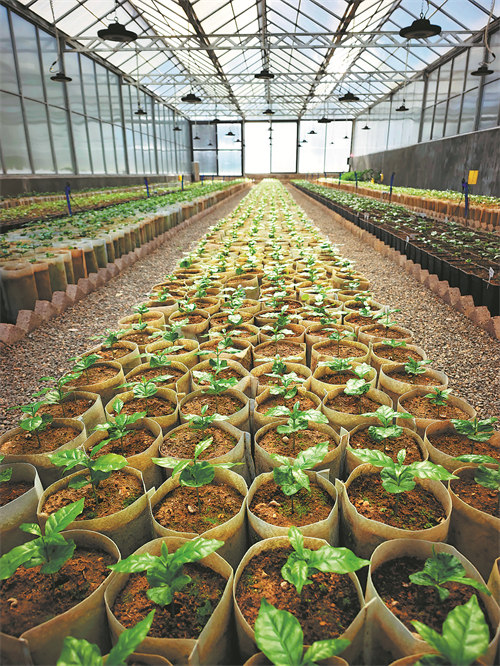Love for coffee revitalizes a mountain


Wang also made a point of teaching local farmers the proper way to drink coffee.
Each year, his coffee estate hosts a harvest festival, where he invites all the local growers to taste the coffee they've cultivated with their own hands.
"Only by learning to appreciate a fine cup of coffee can farmers understand the wide gulf between excellent and inferior varieties and stop blindly opting for disease-resistant, high-yield, but lower-grade strains," he explains.
After years of nurturing the soil, planting over 10,000 trees, and carefully selecting the best coffee varieties, Wang saw his dream begin to take root.
The once-barren slopes of the mountain began flourishing with lush, green coffee trees.
By 2024, his coffee plantation achieved its first harvest of high-quality Arabica beans, which were then processed, roasted, and sold to customers who appreciated the unique flavor that the high-altitude beans possess.
As a result, the sale of these beans quickly became a primary source of income for many in the village; and the mountain village began to draw attention from coffee connoisseurs and eco-tourists alike.
Wu Hua, a cultural new economy professor at Shanghai University, visited Shitizhai multiple times and saw the story of the Gaoligong Mountains as having many layers.
"A dilapidated, abandoned settlement brought back to life; local farmers who had once been forced to leave for city jobs now finding prosperity in their own fields; a barren hillside turning green again; and a coffee industry that was once world-renowned but had fallen into decline is now regaining its strength," she says.
Wu considers the work done by Wang and his team as a new vision for rural revitalization.
"What we've seen in Shitizhai is how biodiversity restoration and specialty agriculture can come together to create harmony between people and nature," she adds.
Today, Wang's days at Shitizhai unfold at a pace set by the mountain's rhythms. He and his team, most of whom followed him from Shenzhen, rarely leave the village.
"It takes 40 minutes to go down the mountain by car. Unless we need to send coffee or welcome guests, we don't leave," he says.
When visitors do make the winding journey up to the estate, which sits at an elevation of 1,800 meters, they get to taste coffee brewed from locally grown beans while taking in the crisp air and lush slopes of the Gaoligong Mountains.
Wang and his team are committed to a holistic approach, which includes researching and breeding coffee varieties and roasting and extraction, ensuring they handle the entire process themselves.
To showcase the charm of his coffee beans, he also opened two cafes in Shenzhen in 2021 and 2024, respectively.
Neither cafe offers takeout or milk-based drinks. The idea is to encourage people to slow down and enjoy a cup of coffee as it is meant to be experienced, Wang says.
"A coffee shop isn't just about selling coffee. It should be a space for people to connect and exchange ideas," Wang explains.
In charting his life's course, Wang chose to "walk back". But to him, this was never an act of retreat but "simply a choice", he says.
Wang believes the countryside holds vast, open spaces for possibilities.
"I don't see the countryside as the opposite of the city. To me, it should be a place where your skills, your talents, and your dreams can fully unfold," he says.



































